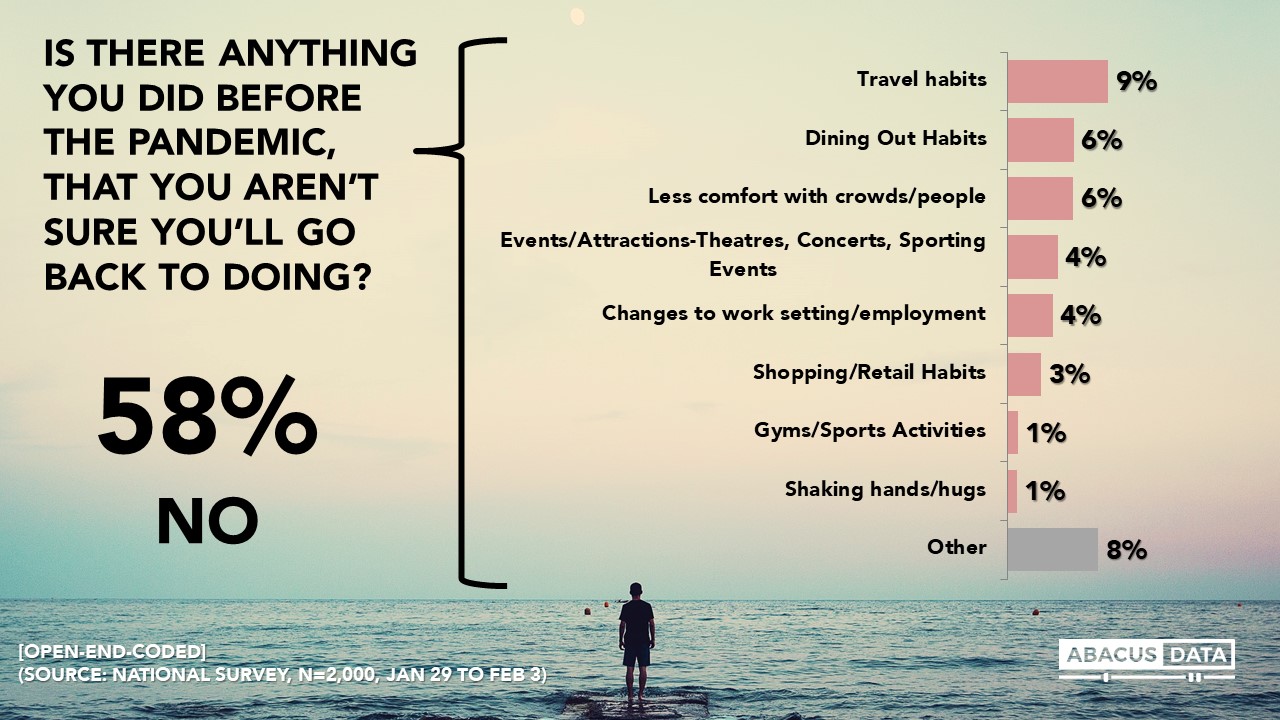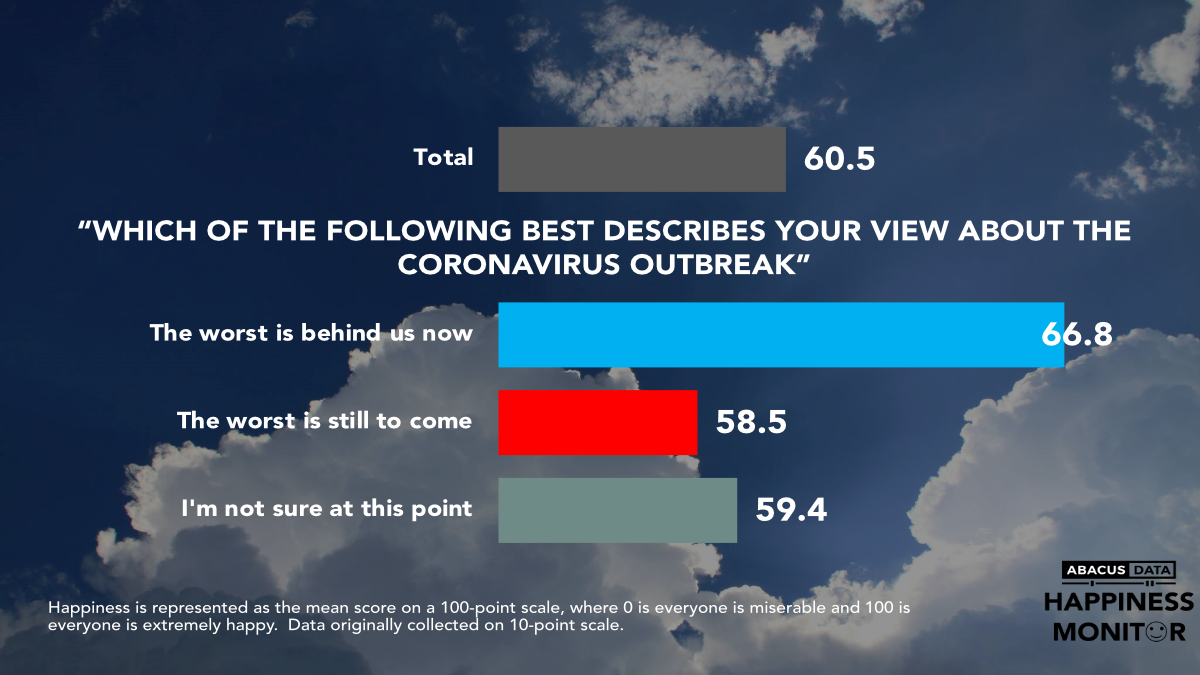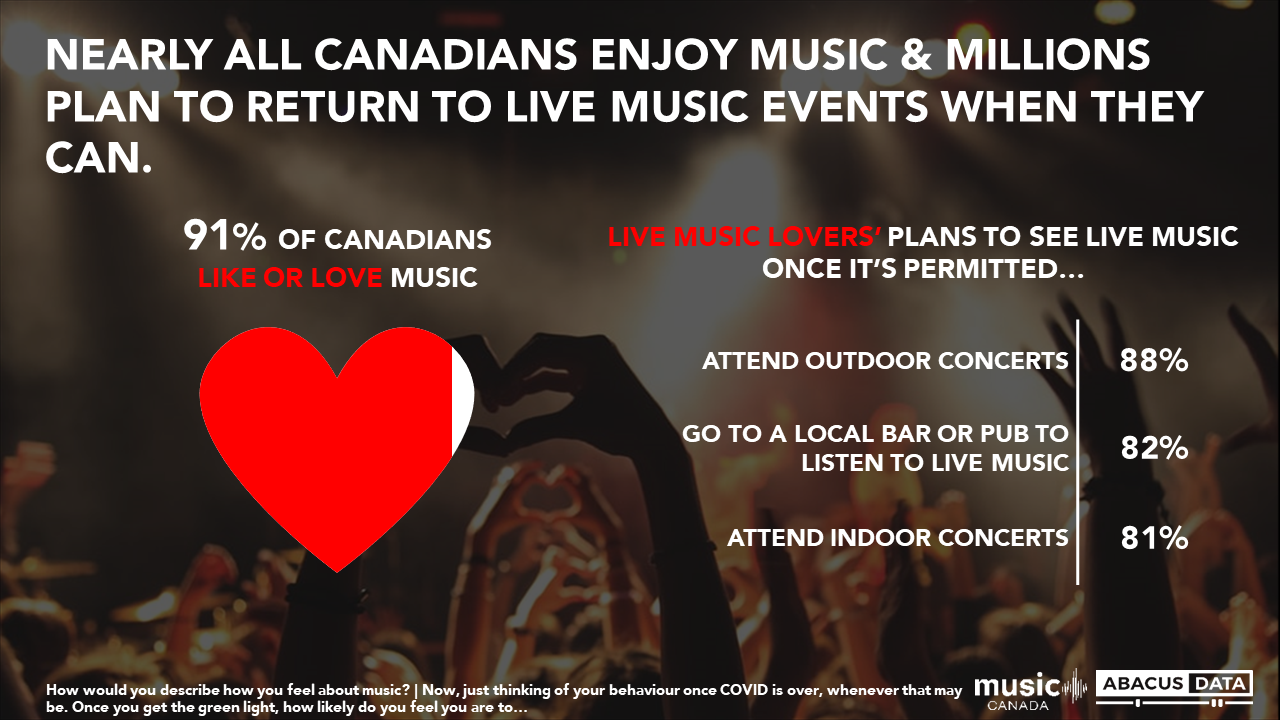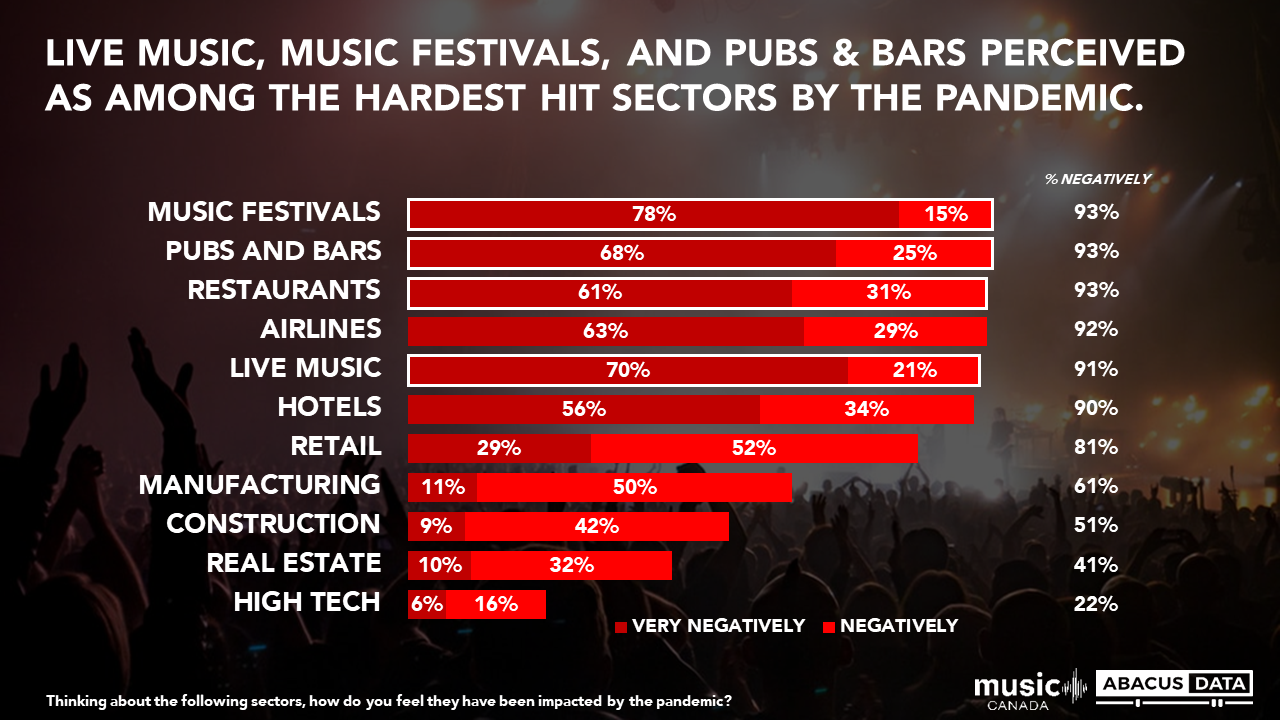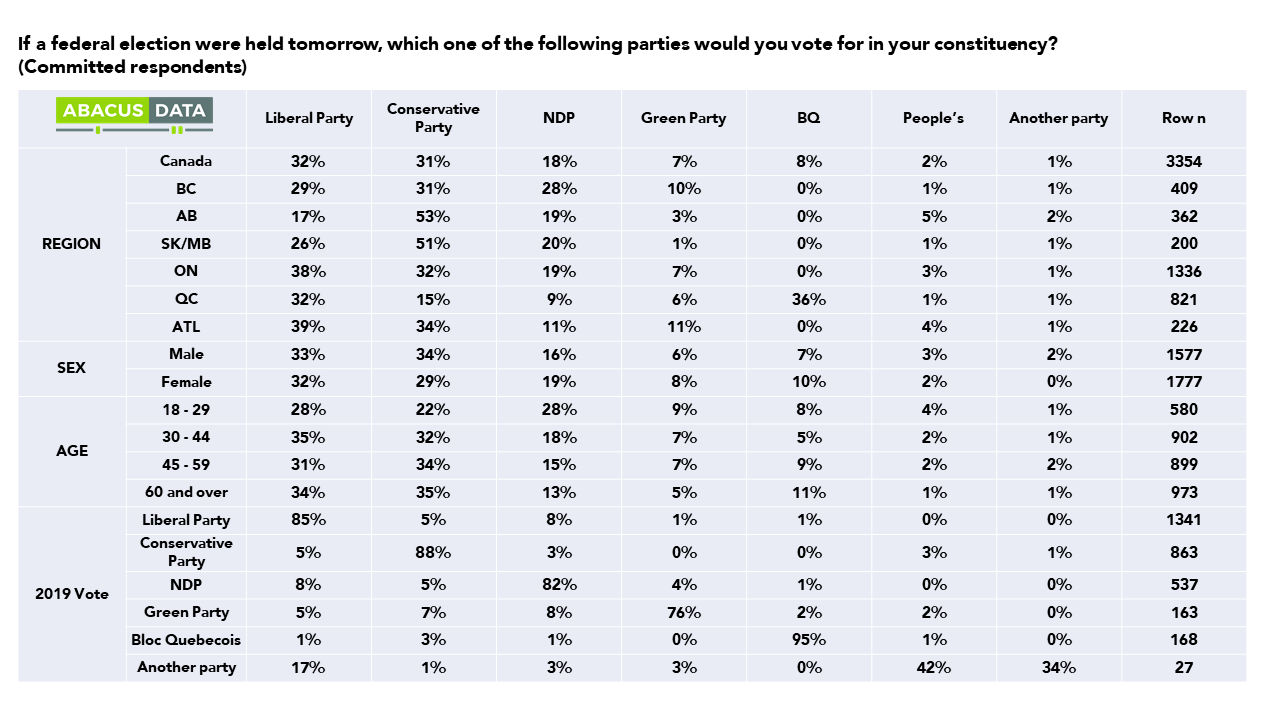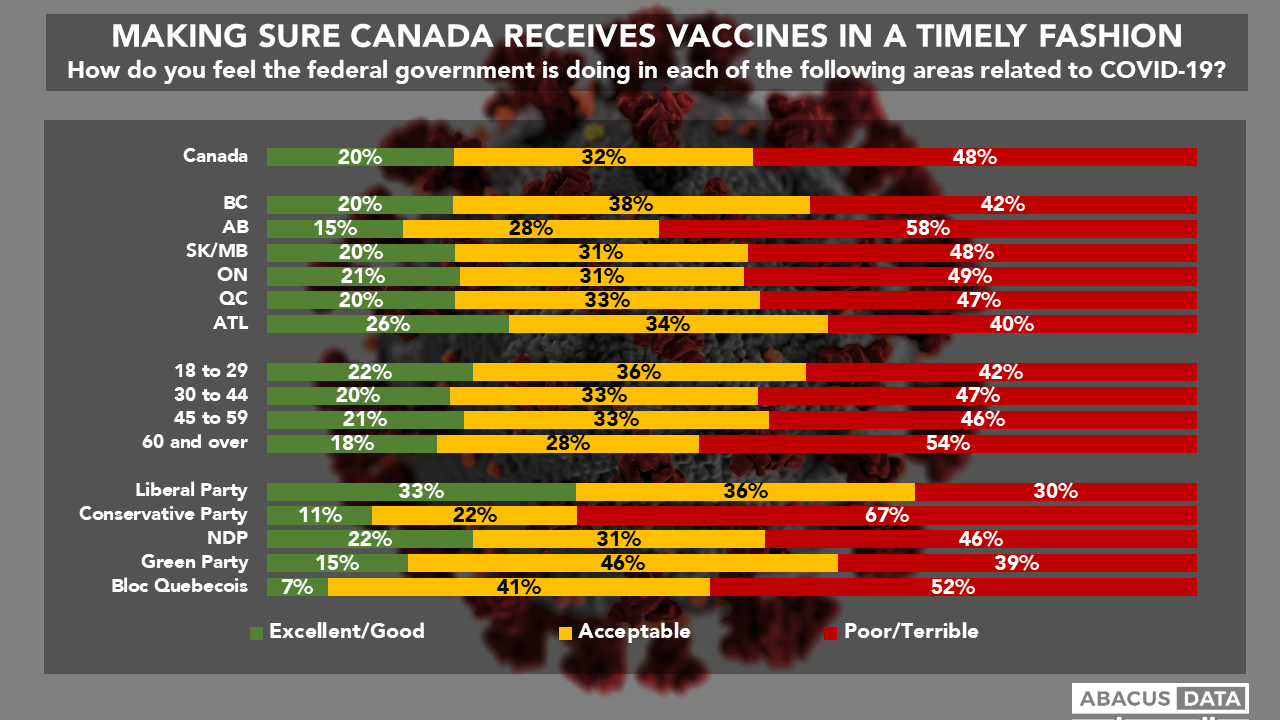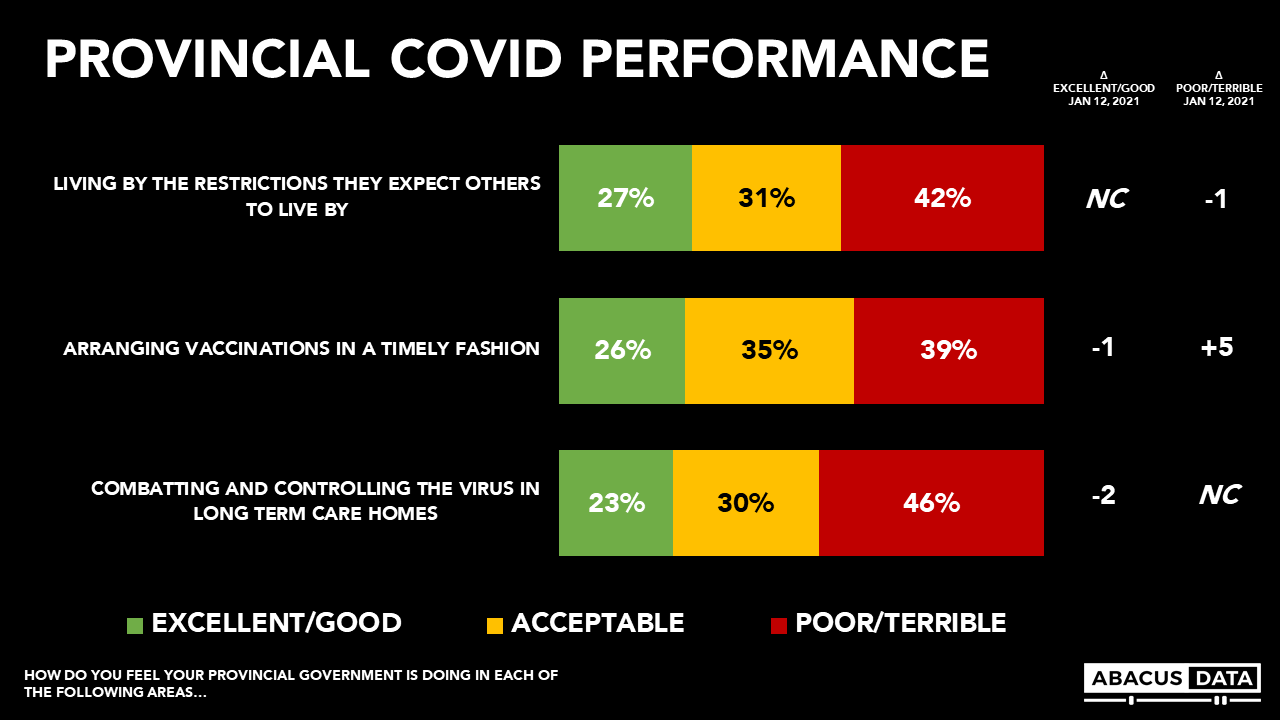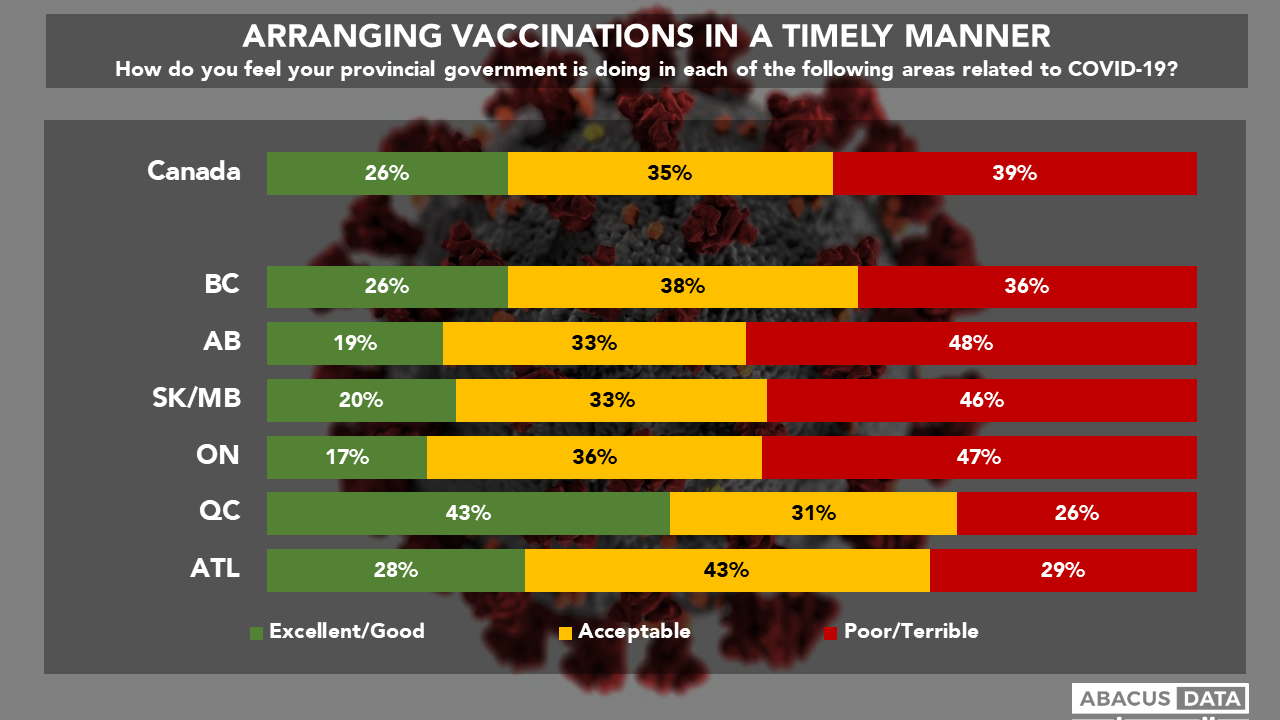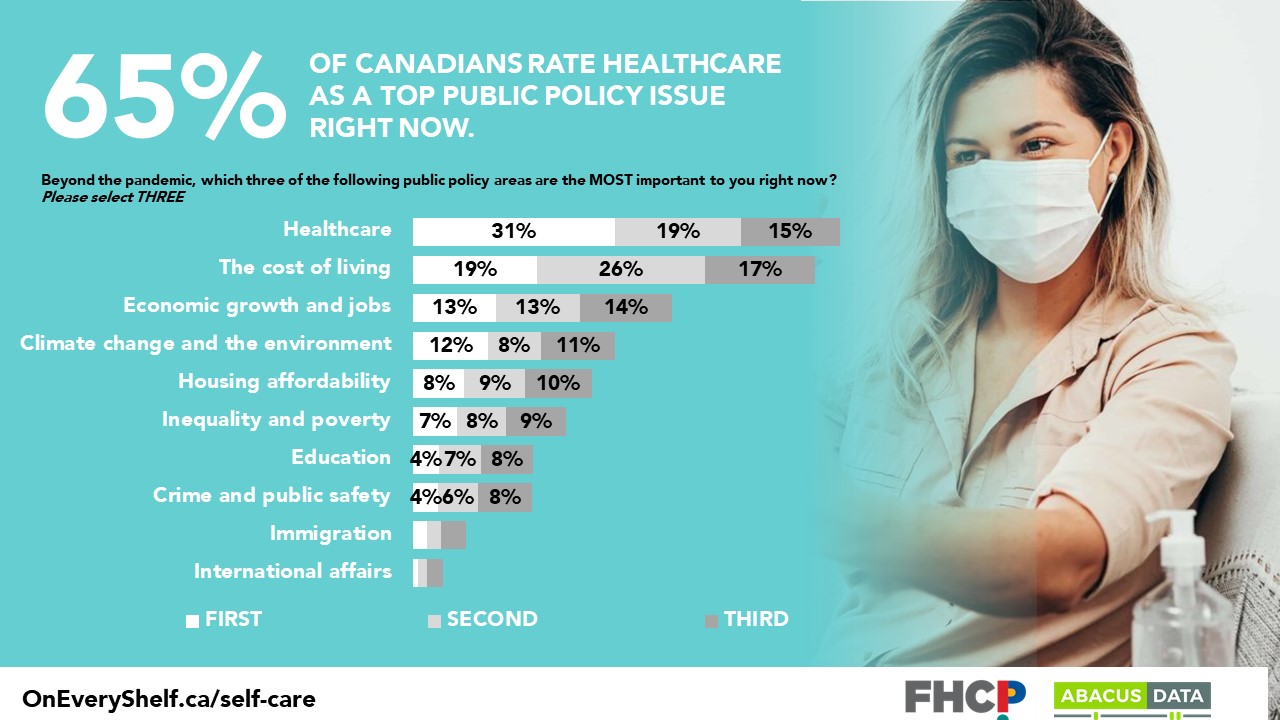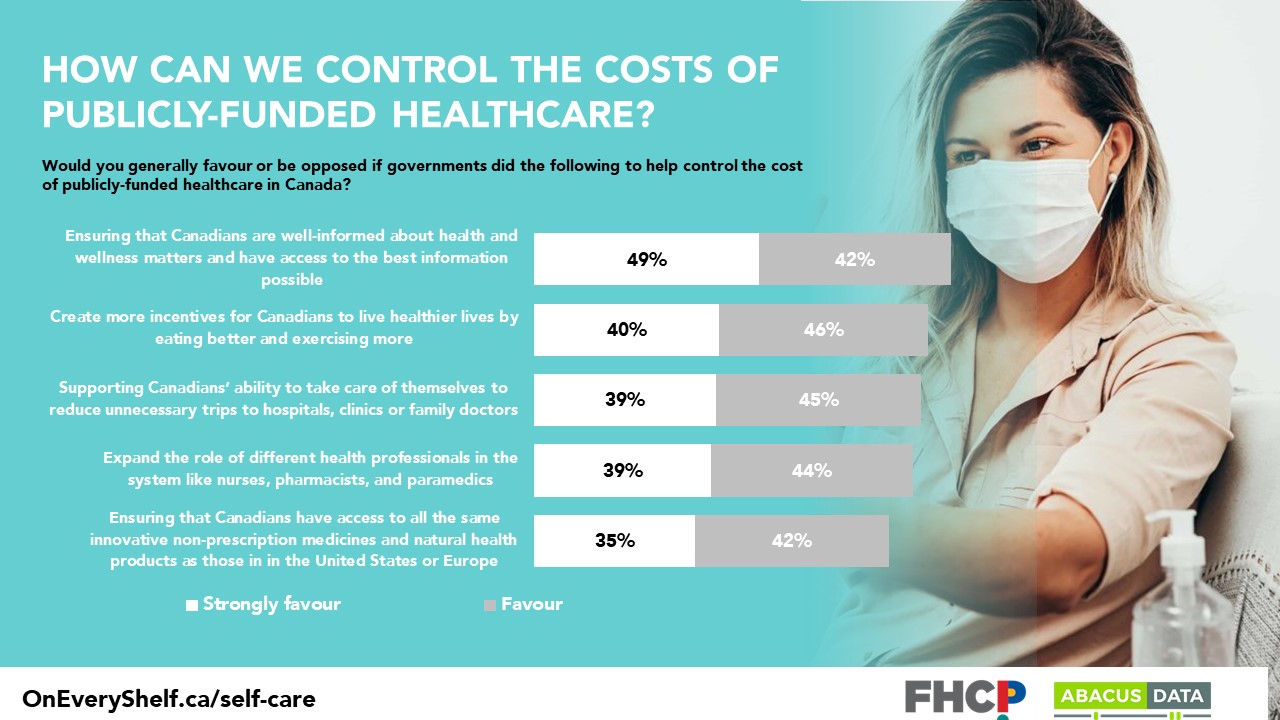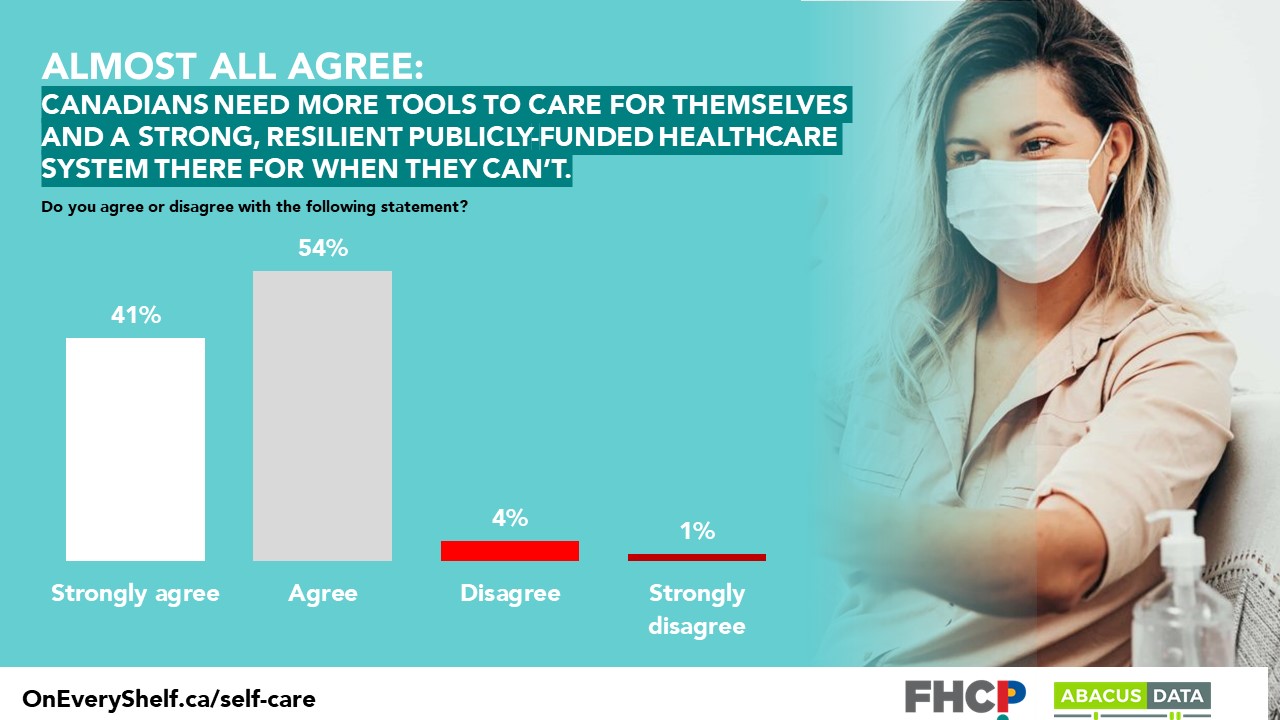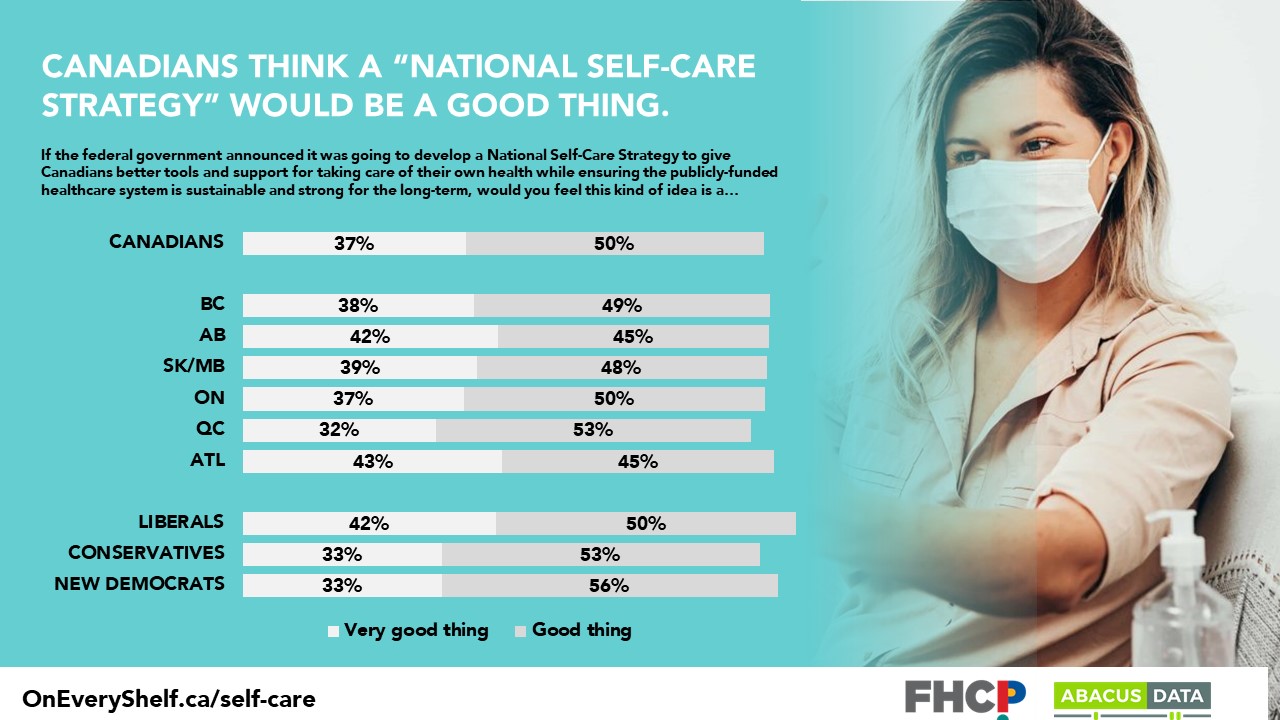Canadians & the COVID-19 Shot: Patient and Mostly Confident
Listen to David Coletto’s new podcast inFocus with David Coletto
Listen to Bruce Anderson & Peter Mansbridge Wednesday’s on Smoke, Mirrors and the Truth, a podcast within Peter Mansbridge’s podcast The Bridge.
By Bruce Anderson & David Coletto
Roughly two out of three Canadians expect to be offered a COVID-19 vaccine shot before the end of September timetable discussed by the Prime Minister, and about 60% of them consider that timing to be acceptable or better.
One in five people don’t expect to have access to a shot until 2022, and 58% of that group considers that timing acceptable.
The patterns in these data suggest that if the government meets that timetable most people will be satisfied with that, although it is reasonable to assume that these perceptions will fluctuate depending on a number of factors. People may find themselves happier once they have the shot, or frustrated if they feel that the pace relative to the United States or other countries is lagging. Alternatively, their mood might change based on the health of the economy and how quickly they are able to return to more normal activities.
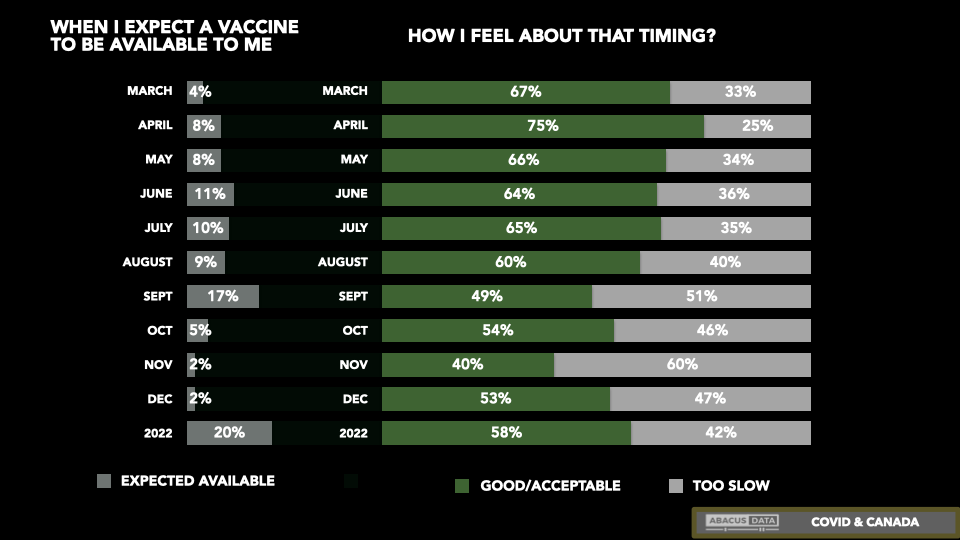
It seems reasonable to assume based on these expectations, and the announcement by the federal government last week about accelerating Pfizer shipments and the authorization of the Johnson and Johnson vaccine, that the government’s vaccine roll-out may outperform what more than half of the population expects.
Based on their current expectations of when a vaccine will be available to them personally, 40% believing that the timing they expect to be offered a vaccine will be unacceptably slow. Older people are somewhat more unhappy than younger people but the difference is about five percentage points. The most dissatisfied are Conservative voters, 50% of whom say the timing will be too slow. Among NDP voters 42% are anticipating too slow an availability.
VACCINE HESITANCY
In our polling, 4% say they have had the first shot, and 58% say they will take the shot as soon as it is available to them. That leaves a total of 38% exhibiting some form or degree of hesitancy, including 8% who say they will not take the vaccine under any circumstances, 9% prefer not to but could be convinced, and 21% who expect to take the vaccine but would prefer to wait a bit before taking it.
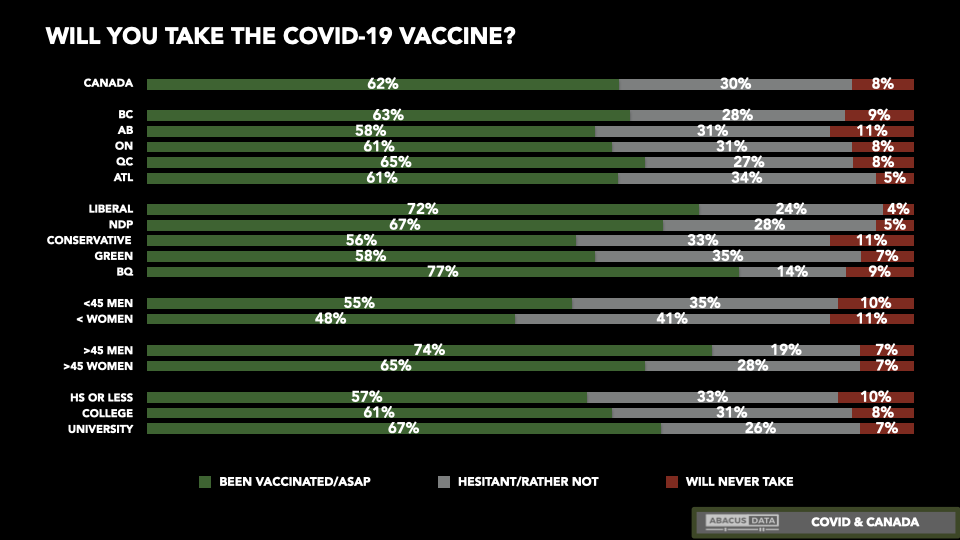
Those most likely to exhibit hesitancy are people under 45, particularly women under 45, as well as those with less formal education, and Conservative and Green Party voters.
There are slightly different levels of confidence in the different vaccines that have been approved for use in Canada. Pfizer and Moderna enjoy equal levels of public confidence, while Johnson and Johnson is slightly lower because there is a higher “unsure” level. Astra Zeneca has a lower level of public confidence, especially among Conservative voters and women.
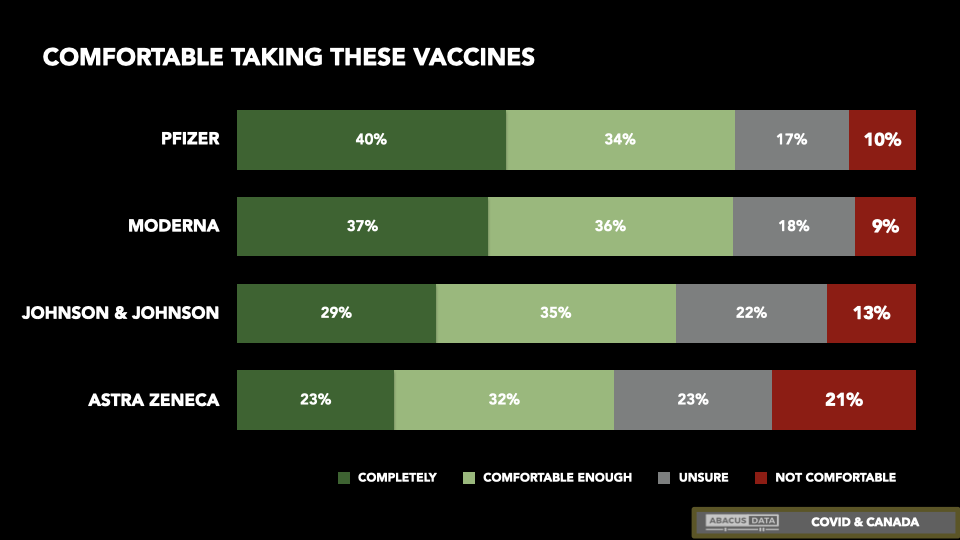

UPSHOT
According to Bruce Anderson: “For most people, getting access to a vaccine is a crucial priority in their lives, and hesitancy levels have come down a bit as people see vaccines being administered around the world in increasing amounts.
For the federal government, the public remains relatively patient with the timetable laid out by the Prime Minister and improvements on that timetable are likely to be met with public appreciation. The data about Astra Zeneca’s vaccine is a clear signal of how closely attentive people are to vaccine safety questions and thus that confidence is always a bit fragile and momentum could be put at risk if doubt about safety becomes a more prominent political discussion.”
METHODOLOGY
The survey was conducted with 2,000 Canadian adults from March 2 to 5, 2021. A random sample of panelists were invited to complete the survey from a set of partner panels based on the Lucid exchange platform. These partners are typically double opt-in survey panels, blended to manage out potential skews in the data from a single source.
The margin of error for a comparable probability-based random sample of the same size is +/- 2.1%, 19 times out of 20.
The data were weighted according to census data to ensure that the sample matched Canada’s population according to age, gender, educational attainment, and region. Totals may not add up to 100 due to rounding.
And don’t miss any of our research and analysis, plus get our weekly Worth A Look newsletter. Sign up today.
ABOUT ABACUS DATA
We are the only research and strategy firm that helps organizations respond to the disruptive risks and opportunities in a world where demographics and technology are changing more quickly than ever.
Find out more about what we are doing to help clients respond to the COVID-19 pandemic.
We are an innovative, fast-growing public opinion and marketing research consultancy. We use the latest technology, sound science, and deep experience to generate top-flight research-based advice to our clients. We offer global research capacity with a strong focus on customer service, attention to detail and exceptional value.
We were one of the most accurate pollsters conducting research during the 2019 Canadian Election.

Contact us with any questions.
Find out more about how we can help your organization by downloading our corporate profile and service offering.
METHODOLOGY
The survey was conducted with 2,000 Canadian adults from March 2 to 5, 2021. A random sample of panelists were invited to complete the survey from a set of partner panels based on the Lucid exchange platform. These partners are typically double opt-in survey panels, blended to manage out potential skews in the data from a single source.
The margin of error for a comparable probability-based random sample of the same size is +/- 2.1%, 19 times out of 20.
The data were weighted according to census data to ensure that the sample matched Canada’s population according to age, gender, educational attainment, and region. Totals may not add up to 100 due to rounding.






















